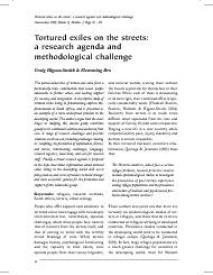Tortured exiles on the streets: a research agenda and methodological challenge
The paired adversities of torture and exile form a particularly toxic combination that leaves people vulnerable to further abuse, and lacking support for recovery and integration. A descriptive study of tortured exiles living in Johannesburg explores this phenomenon in South Africa, and is presented as an example of a more widespread problem in the developing world. The authors argue that the challenges in studying this elusive group contribute greatly to its continued isolation and exclusion from care. A range of research challenges and possible solutions are discussed, including challenges relating to: sampling; the prevention of exploitation, distress and harm; interviewing challenges; language; research logistics; local laws; and care for research staff. Finally a broad research agenda is proposed in the hope that better information about tortured exiles living in the developing world will assist policy makers and service providers to build stronger and more accessible systems for the protection and support of this vulnerable group.
Geachte bezoeker,
De informatie die u nu opvraagt, kan door psychotraumanet niet aan u worden getoond. Dit kan verschillende redenen hebben,
waarvan (bescherming van het) auteursrecht de meeste voorkomende is. Wanneer het mogelijk is om u door te verwijzen naar de bron
van deze informatie, dan ziet u hier onder een link naar die plek.
Als er geen link staat, kunt u contact opnemen met de bibliotheek,
die u verder op weg kan helpen.
Met vriendelijke groet,
Het psychotraumanet-team.
Reference:
Craig Higson-Smith; Flemming Bro | 2010
In: Intervention: the international journal of mental health, psychosocial work and counselling in areas of armed conflict, ISSN 1571-8883 | 8 | 1 | 14-28
http://www.interventionjournal.com/sites/default/files/Higson-Smith%20tortured%20exiles%20research%20agenda%20I10.pdf
In: Intervention: the international journal of mental health, psychosocial work and counselling in areas of armed conflict, ISSN 1571-8883 | 8 | 1 | 14-28
http://www.interventionjournal.com/sites/default/files/Higson-Smith%20tortured%20exiles%20research%20agenda%20I10.pdf


